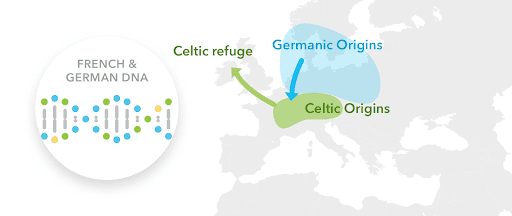Five short stories about the genetic history of Western Europe — from the Celts to Charlemagne.
You probably have some Celtic ancestry (but don’t dig out your bagpipes just yet)
Did you know?
French & German ancestry doesn’t only reflect ancestry from France or Germany. It also represents ancestry from one of the predominantly French or Germanic- speaking countries of Europe, including: Austria, Belgium, France, Germany, Luxembourg, The Netherlands, and Switzerland.
Near the dawn of European written history, Greek scholars recorded the existence of the Keltoi, or Celts — advanced Iron Age tribes with roots near the headwaters of the Rhine and Danube rivers in the Alps.
In the 19th century, finely wrought gold, bronze, and iron artifacts from an early Celtic society were discovered in the Austrian Alps. These artifacts hint at wealth and a facility with metalworking that may have aided in the rapid expansion of the Celts across Europe.
By the 3rd century BCE, there were Celtic-speaking peoples from the British Isles to the Black Sea.
So, you probably inherited some Celtic-like DNA even if your family never lived in the British Isles, but it’s old…really old.
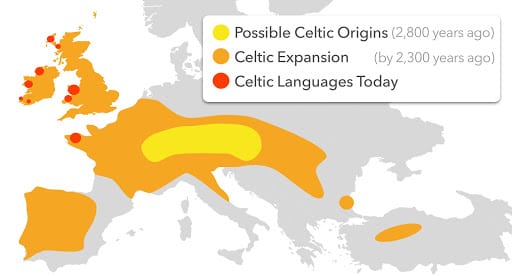
When Europe belonged to Caesar
After fending off frequent attacks from the Celtic tribes of Gaul (the heart of which is now France and Belgium), Julius Caesar and his Roman legions decided to remove this Celtic threat for good.
In 58 BCE, Roman troops led by Caesar began a series of devastating military campaigns to subjugate the Celtic tribes and secure the western bank of the Rhine River—a natural barrier against the restless Germanic tribes to the east. By 51 BCE, Gaul fell to Caesar.
Over the next 500 years, Latin became the lingua franca in Gaul, and Celtic languages found refuge along the Atlantic fringe of Europe.
Despite this massive cultural shift, genetic evidence suggests the Romans from Rome didn’t leave much DNA behind in Gaul.
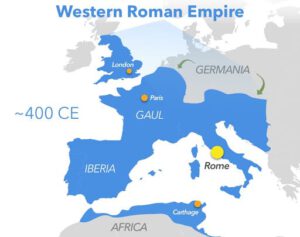
German tribes go South
Ever heard of “Francia”? The “Frankish Kingdom”? The “Franks”?
It’s fine if you haven’t, but you might have a genetic connection to them.
After the fall of the Western Roman Empire in 476 CE, the Franks — a federation of Germanic tribes led by Clovis I — wrested control of Gaul from the Romans and Visigoths, marking the founding of Francia (the Frankish Kingdom) and the beginning of the Merovingian Dynasty.
Germanic-speaking precursors to the Franks and other Germanic tribes are thought to have originated in southern Scandinavia over 3,000 years ago, expanding further and further south into formerly Celtic and Roman territory. Recent studies found evidence that the widespread migrations of Germanic peoples between the 4th and 6th centuries (called the “Migration Period”) had a more significant impact on northwestern and central Europe’s DNA than did the expansion of the Roman Empire.
The Spirit of Francia
Did you know?
23andMe’s “French & German” ancestry falls roughly within the historical bounds of the Frankish Kingdom—Francia—as it existed in the early 9th century under Charlemagne.
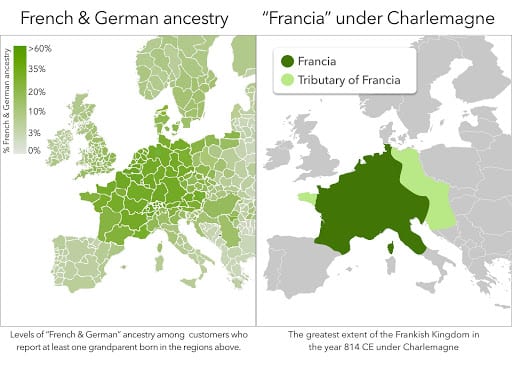
And, speaking of Charlemagne…
How you could be descended from Charlemagne, King of the Franks
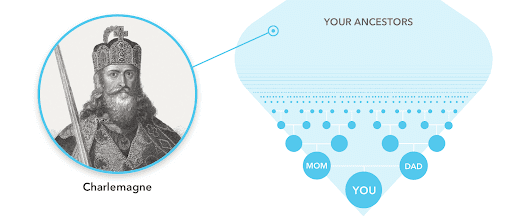
Fast Facts
• Approximately 1 million 23andMe customers have a majority French German Ancestry, while over 5 million customers possess at least 1 percent of this genetic heritage
• Today, Frenchand German Ancestry is widespread across central and western Europe, with particularly high concentrations near the Upper Rhine River, where France, Germany, and Switzerland converge.
• “French and German Ancestry is most prevalent among 23andMe customers from Switzerland, with an average of around 64 percent.
The authors of a recent study estimated that every European who lived over 1,000 years ago — and left descendants — is very likely the ancestor of every ethnically European person alive today. And Charlemagne, King of the Franks, was particularly prolific, siring around 20 children.
Suppose you go far enough back in time. In that case, your pedigree is actually “collapsing” repeatedly, with many of your ancestors showing up on multiple branches of your family tree.
So, if you have European ancestry, you’re probably descended from Charlemagne.

